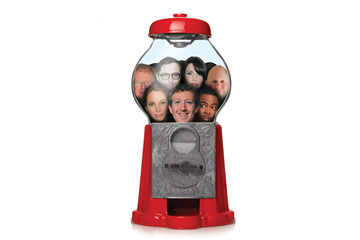
One of the greatest things about the Internet is that I can bother anyone. One of the worst things about the Internet is that anyone can bother me. But Facebook, which has solved every other human quandary–from “I wonder what that person I hooked up with is up to now” to “I wonder what that person I never hooked up with is up to now”–has now solved this issue as well by running a test program that charges users to send messages to people they don’t know.
When I called to find out if I could get out of paying, Facebook spokesperson Jessie Baker told me the charge applies if the sender and recipient are separated by more than one degree. Otherwise the messages go to an “other” inbox, which no one on Facebook knows exists. The idea, Baker told me, is to use economic signals to cut down on unwanted messages, charging $1, $5 and $15 a message, depending on the recipient. When corporations rank people as if we’re mere commodities, I do not sit idly by. I immediately get to work finding out how highly I am ranked.
Through investigative journalism involving calling well-connected friends, creating a fake account and losing a few hours looking up people I never hooked up with, I discovered that it costs $15 to send me a message, which I know no one will ever pay since my father won’t spend $15 to ship me my old baseball cards. But that price does signal an important fact: it costs 15 times more to message me than the editor of Time, Rick Stengel. This is something people at our company are going to have to give some serious consideration to. And as harsh as those conclusions may be, at least they can deliver them to Rick with hardly any damage to our bottom line.
My research, which I did not run by Facebook for fear that I might get demoted to $5, revealed that it costs just $1 to message mogul Barry Diller, actors Ed Begley Jr., Chris Rock, John Hodgman and Whitney Cummings, writers David Brooks and Naomi Wolf, TV hosts Piers Morgan and Donny Deutsch, model Christy Turlington and teachers’ union head Randi Weingarten. And Nicholas Christakis, the Harvard social scientist whose studies about how weight and happiness can be as affected by your friends’ friends’ friends as by changes in your own life got him named one of Time’s 100 most influential people in the world. Christakis claimed not to care but then said, “I certainly would not pay $15 to write to you.” With a tone like that, I am very, very glad that he will no longer be communicating with me for free.
Begley, however, embraced his worthlessness. “I would make myself available to be contacted by anyone and everyone on Facebook for a mere 25¢, of which I’m offering Mark Zuckerberg 24¢ as a handling fee,” he said. “I intend to make up the difference in volume.”
Baker told me that while the company originally priced some people, including CEO Zuckerberg, at $100, it stopped–I’m guessing because asking people for $100 to communicate with an insanely rich dude is socially acceptable only at events where athletes sign things. The $15 club includes Netscape co-founder Marc Andreessen, writer Susan Orlean and Craig Newmark, the founder of Craigslist. When I told Newmark, he said, “Facebook’s software is delusional, or it simply likes nerds better.” I like to think that the entire world just likes nerds better now. And also me.
To find out if the economics are as sound as they seem, I contacted economist Richard Thaler and Cass Sunstein, who wrote Nudge, a brilliant book about behavioral economics. Then I threw out their opinion since it costs only $1 to message either of them. But Duke behavioral economist Dan Ariely, who is valued at $15, told me that Facebook’s logic was faulty. “If somebody is spending $15 sending me a request, now I feel a larger obligation to answer their e-mails. That would increase my obligation,” he said. It’s also a lot of money to spend knowing there’s a chance that my assistant won’t pass on a message from a fan so dangerously crazed that he’d spend $15 to get to me. And now that I’m worth $15 a message, I’m definitely getting an assistant.
When Internet companies actually employ economics, they have to admit that many of the Web’s guiding principles–information wants to be free, everyone should be treated equally–don’t work. Facebook’s cold, hard algorithm shows that as the old, top-down power structures crumble in this Web 2.0 world, we need to stop kowtowing to politicians, tycoons and academics, some of whom may have thrown off the algorithm by limiting their friends, and start acknowledging those of us who now master the universe. For just $15, you can ask us what we’re going to do with it.